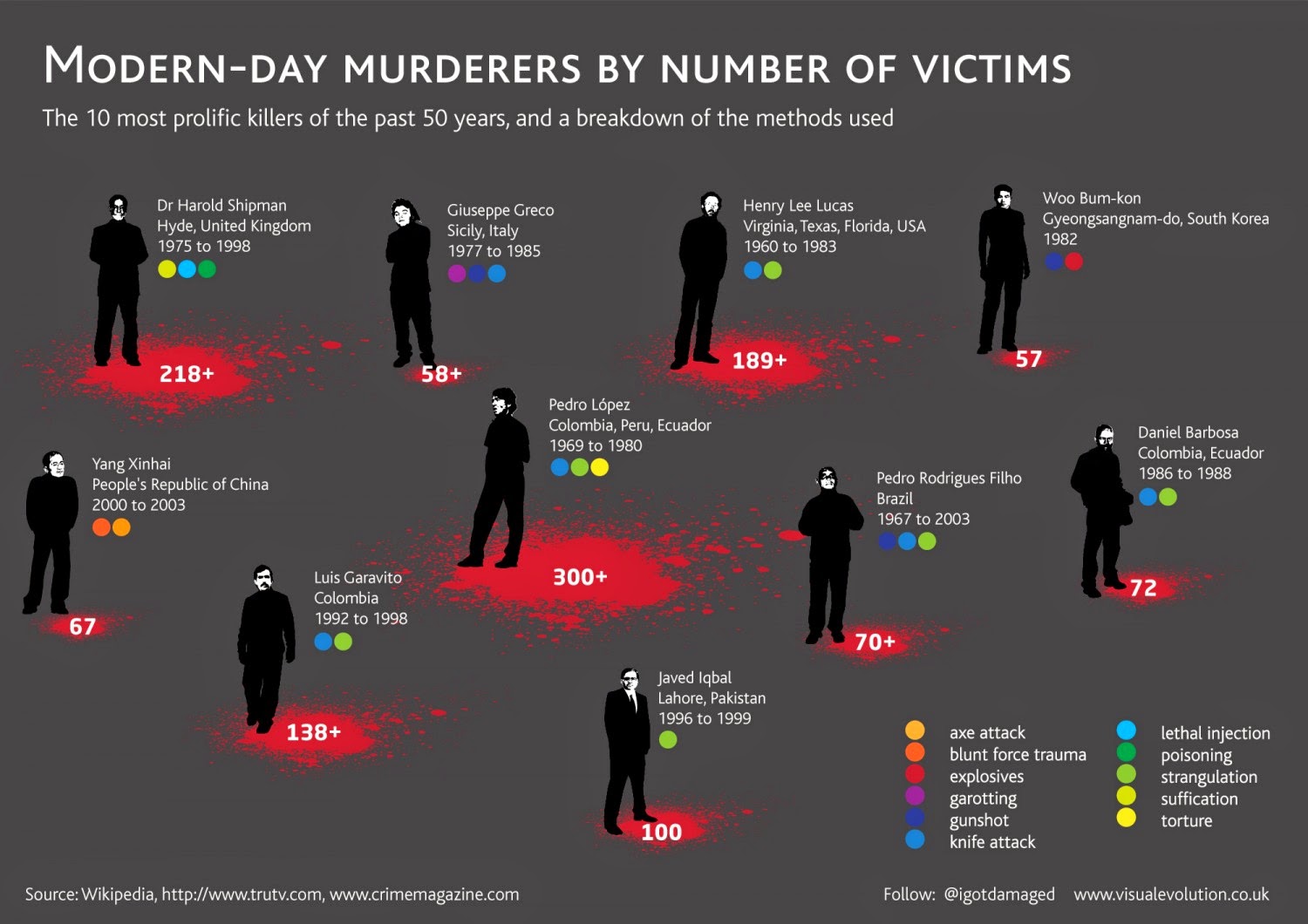Murderers have always fascinated society, not only due to the heinous acts they commit but also because of the complex backgrounds that shape their lives. The names of these individuals become etched in the annals of history, often evoking fear, curiosity, and even a morbid fascination. From notorious serial killers to one-time offenders, the names of murderers serve as a chilling reminder of humanity's darker side. Understanding the stories behind these names is crucial to comprehending the societal and psychological factors that lead to such violence.
In this article, we will explore some of the most infamous murderers names, delving into their backgrounds, the crimes they committed, and the aftermath of their actions. We will examine what drives a person to commit such egregious acts and how society responds to these individuals. Furthermore, we will discuss the impact these murderers have on their victims' families and the larger community.
Join us as we navigate the murky waters of murderers names, shedding light on the lives that led to their infamous actions and the lasting legacies they leave behind. This exploration may not only satisfy your curiosity but also encourage a deeper understanding of the complexities of human behavior and morality.
Who Are Some Notorious Murderers Names?
When discussing murderers, several names come to mind that have shocked and horrified the public. These individuals have committed heinous acts that have left a lasting impact on society. Here are a few notable names:
- Jack the Ripper
- Jeffrey Dahmer
- Aileen Wuornos
- Ed Gein
- Ted Bundy
What Drives People to Become Murderers?
The motivations behind committing murder are as varied as the individuals themselves. Factors can include:
- Psychological Issues: Many murderers suffer from severe mental illnesses.
- Environmental Influences: A troubled upbringing or exposure to violence can lead to violent behavior.
- Societal Factors: Economic disadvantage and lack of opportunities can contribute to criminal behavior.
- Substance Abuse: Drugs and alcohol can impair judgment and exacerbate violent tendencies.
What Are the Common Characteristics of Murderers?
Murderers often share certain traits that can be indicative of their violent tendencies. Some common characteristics include:
- Manipulative Behavior: Many murderers are skilled at manipulating others, often gaining their trust.
- Lack of Empathy: A distinguishing feature is their inability to feel empathy for others.
- Impulsivity: Many exhibit impulsive behavior, leading to rash decisions that result in violence.
- Charismatic Personality: Some murderers possess a charm that can mask their darker inclinations.
What is the Impact of Murderers on Victims' Families?
The aftermath of a murder extends far beyond the act itself, affecting families, friends, and entire communities. The emotional toll can include:
- Grief and Loss: Family members often struggle with the loss of a loved one.
- Stigmatization: Families of victims may face stigmatization or scrutiny.
- Long-term Psychological Effects: Survivors may experience PTSD, anxiety, and depression.
- Societal Fear: Communities may live in fear, impacting their overall sense of safety.
What Are the Legal Consequences for Murderers?
Legal consequences for murderers vary depending on jurisdiction and the specifics of the crime. Here are some common outcomes:
- Prison Sentences: Most murderers face lengthy prison sentences, often life in prison.
- Death Penalty: In some jurisdictions, the death penalty is a possible consequence.
- Insanity Defense: Some murderers may be found not guilty by reason of insanity.
Who Were The Most Infamous Female Murderers?
While murderers are often portrayed as male, several notorious female murderers have left their mark on history. Some names include:
- Aileen Wuornos
- Mary Ann Nichols
- Judy Buenoano
- Elizabeth Báthory
Understanding the Psychology Behind Murderers Names
The psychology of murderers is complex and often deeply rooted in their past experiences. Understanding these psychological aspects can provide insights into their actions. Some key points include:
- Childhood Trauma: Many murderers have experienced severe trauma or abuse during childhood.
- Personality Disorders: Conditions like antisocial personality disorder are common among murderers.
- Desire for Control: Some murderers seek to exert power over their victims, stemming from feelings of powerlessness.
Can Society Prevent the Rise of Future Murderers?
Preventing future murders requires a multi-faceted approach, including:
- Education: Teaching empathy and conflict resolution from a young age.
- Mental Health Support: Increasing access to mental health resources for individuals in need.
- Community Programs: Supporting at-risk youth through mentorship and community engagement.
- Law Enforcement Training: Providing law enforcement with the tools to identify and intervene in potential violent situations.
A Closer Look: The Biography of Jeffrey Dahmer
One of the most notorious murderers in American history, Jeffrey Dahmer, is infamous for his gruesome acts. Born on May 21, 1960, Dahmer's early life was marked by turmoil and family issues, which may have contributed to his later criminal behavior.
| Personal Details | Bio Data |
|---|---|
| Name | Jeffrey Lionel Dahmer |
| Date of Birth | May 21, 1960 |
| Place of Birth | Milwaukee, Wisconsin, USA |
| Crimes | 17 counts of murder, sexual assault, and dismemberment |
| Arrested | July 22, 1991 |
| Sentencing | Life imprisonment |
| Date of Death | November 28, 1994 |
Dahmer was known for his gruesome acts, which included not only murder but also necrophilia and cannibalism. His life ended in tragedy when he was murdered in prison by a fellow inmate. His case remains a chilling reminder of the darkness that can exist within humanity and serves as a focal point for discussions about the psychological profiles of murderers.
Unveiling The Life Of Ronaldo's Daughter: A Star In Her Own Right
Unveiling Corinna Kop: The Rising Star Of Social Media
Unraveling The Beauty Of Dreads Hairstyle


